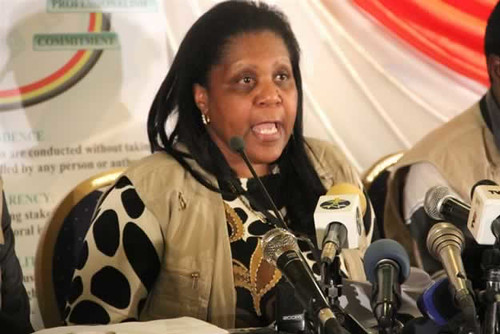
SADC Observer Mission to Zimbabwe Chairperson Advocate Notemba Tjipuejan of Namibia. The mission said the elections were free and fair., a photo by Pan-African News Wire File Photos on Flickr.
Harmonised elections free, fair, peaceful and credible
September 5, 2013
Opinion & Analysis
Muchadura Dube
Zimbabwe Herald
The recently held and successfully concluded July 31 2013 harmonised elections had all the ingredients of free, fair, peaceful and credible elections. Detractors had hoped for chaotic elections to get justification for their illegal machinations such as their continued insistence on illegal and evil economic sanctions. The manner in which the elections were held shamed preconceived claims by the Europeans and Americans that the elections would not pass the credibility test.
While the Sadc Election Observation Mission report hailed the elections as free, peaceful, and credible and indeed a sufficient expression of the will of the people, the report also noted that there were areas where the country needed to improve on in future. That, on its own, is not an indictment of the entire political process or any particular political party but a clarion call to all stakeholders who constituted the inclusive Government, of the infinite possibilities that exist for Zimbabwe now and in the future.
The elections were indeed fair since the playing field was level for all the competing parties. Parties involved in the harmonised elections had equal access to the six radio stations as evidenced by the frequent campaign messages. No political party had monopoly of the radio stations. The country’s TV station afforded the participating political parties an opportunity to sell their ideas to the electorate prior to the July 31 2013 election.
Though polarised, the print media were awash with stories from the rival political parties in the pre- and post-election period. In this regard, the fairness of the elections to all political parties is not in doubt. What then needs to be probed is the extent to which pirate radio stations, long known for parroting a certain political party’s views, tilted the election result in that party’s favour.
Pirate radio stations are at the forefront of spreading hate speech and falsehoods, in the same vein agitating for pandemonium in the country. It is a public secret that the MDC formations benefitted politically from the pirate radio stations. Is it not selective amnesia for the same political parties to claim that the media was biased in favour of Zanu-PF?
All the political parties accessed the voters’ roll at the same time. The SEOM has rightly reasoned that the absence of an electronic version of the voters’ roll was inconsequential. If ever there was prejudice over the absence of an electronic voters’ roll, then, it affected all parties. Mind you, the hard copy version of the voters’ roll was distributed timely throughout the country’s polling stations. In this instance, it begs the question as to which political party benefitted if all the political parties accessed the voters’ roll at the same time.
No shred of evidence has been proffered by losing political parties to support complaints about the election’s fairness on the strength of the voters’ roll. It’s simple; the July 31 elections were free and fair.
The illegal economic sanctions strangulating the economy were meant to achieve a certain political objective. Chester Crocker, the-then US Assistant Secretary of State for African Affairs, once remarked that the United States sanctions law, ZIDERA, was conceived to make the Zimbabwean economy scream, at the same time separating President Mugabe and Zanu-PF from the people.
The-then British Foreign Secretary, Robin Cook, stated that the economic embargo on Zimbabwe would incite the population to publicly stone Zanu-PF officials. Such statements from purported champions of democracy and fairness are as hollow as a devil reciting beatitudes. One does not need to be a prophet to understand that the July 31 2013 elections were heavily tilted against Zanu-PF! But, alas, it is the British founded and nurtured MDC formations that scream the loudest, claiming that the elections were held in an environment favouring Zanu-PF.
The elections witnessed a paltry 300 000 people being turned away for various reasons ranging from lack of proper identification to attempting to vote in a wrong ward, among a host of other electoral infringements. Honestly, this voting block that was turned away was not emblazoned with a certain political tag. Neither did they claim to belong to Zanu-PF, the two MDC formations nor any other contesting party.
It is therefore mischievous in the extreme on the part of any political party to claim ownership of such potential voters. In the slightest chance of them having voted for the MDC formations, the changes to their electoral fortunes could have been negligible.
Assuming that the said potential voters were all MDC-T, the party would still have lost dismally. And if they were Zanu-PF, the numbers could have cemented the party’s resounding win. The voters who were turned away could have benefitted any political party. This goes further to show the fairness of the July 31 polls.
It should be clear to all and sundry that the harmonised elections were a notch above the expected Sadc and AU standards. The peaceful conduct of the elections rivals conditions that obtain during elections in most European countries. The fact that Zanu-PF won resoundingly is a firm statement of commitment by Africans that they are now masters of their destiny.
On the contrary, MDC formations lost on the backdrop of their fiercely anti-African ideology that assumes the perpetual superiority of whites over blacks.
No comments:
Post a Comment